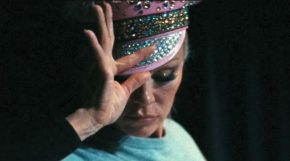A diva blessed with an enthralling coloratura, an authentic performer of the most difficult Mozart arias and bel canto opera roles, who has the whole world at her feet… Nothing would seem further from this singer, who is now preparing to appear in Budapest as an interpreter of the simplest of vocal genres, the song.
But there’s no mistake, it’s one and the same person, Natalie Dessay, who has retired from the opera stage but still sings in concerts. Before she took leave of the opera in 2013 opera directors were fighting for her – and even then she didn’t spoil us with frequent performances. Dessay has always been a self-aware artist: she took on roles rarely, so that she could give her utmost in them – and that is exactly what she did.
The finest moments of a riveting career
Natalie Dessay’s discography is so rich that only a subjective selection can be made from it. The first place in our imaginary list goes to The Magic Flute with William Christie: a towering piece, and a towering interpretation. The other extreme is represented by Entre elle et lui, a selection of Michel Legrand’s chansons, recorded with today’s famous French opera singers. And finally three Händel discs complete the picture: Alcina, again conducted by William Christie, then a disc of cantatas and Giulio Cesare conducted by Emmanuelle Haïm. The latter, together with the early music group Le Concert d’Astrée which she conducts, will also be among the guests of the Budapest Spring Festival this year.
For many years she was unique in her mastery of a role seen as the crown of the coloratura repertoire: the Queen of the Night in The Magic Flute; after decades of lying forgotten one of the gems of French opera, Delibes’ Lakmé, was produced for her sake, and after the obligatory bel canto parts (mention must certainly be made of Donizetti’s Lucia di Lammermoor in French) she even sang Verdi’s Traviata. But to see Dessay as a sparkling prima donna would be to paint a one-sided image of her art: Debussy’s sorrowful, melancholy Mélisande was just as much one of her great roles as the others listed, even though this role, painted in pastel colours and almost constantly restrained, is very far from the character of a coloratura queen.
What is Dessay’s secret? What personality trait enabled her to blend styles and roles so distant from one another into a unified whole? Well, the pinch of decadence that the world at large likes to think is in the French character certainly has a role to play. This is what gives piquancy to her latest venture, the Schubert songs, also available on disc: alongside, or instead of, the typical Viennese flavours, we can see the familiar and less familiar songs from a different point of view – a feeling of homeliness is replaced by an exciting adventure, with a first class tourguide.

In Dessay’s first appearance in Hungary popular opera arias will flank a varied programme of more pensive songs by Schubert, Pfitzner, Chausson, Bizet, and Debussy, and she will be accompanied by Philippe Cassard on the piano.
Author: Gábor Bóka
This article first appeared in BSF Magazine, published by Budapest Spring Festival. To view the magazine in full, please click here.



























Comments